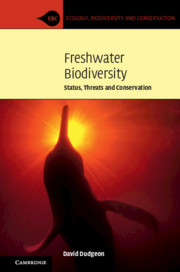Book contents
- Freshwater Biodiversity
- Ecology, Biodiversity and Conservation
- Freshwater Biodiversity
- Copyright page
- Epigraph
- Contents
- Foreword
- Permissions for Epigraphs
- 1 The Freshwater Commons
- 2 Global Endangerment of Freshwater Biodiversity
- 3 Overexploitation
- 4 Alien Species and Their Effects
- 5 River Regulation
- 6 Vanishing Lakes and Threats to Lacustrine Biodiversity
- 7 How Will Climate Change Affect Freshwater Biodiversity?
- 8 Ecosystem Services and Incentivizing Conservation of Freshwater Biodiversity
- 9 Conservation of Freshwater Biodiversity
- Afterword
- References
- Species Index
- General Index
- Plate Section (PDF Only)
8 - Ecosystem Services and Incentivizing Conservation of Freshwater Biodiversity
Published online by Cambridge University Press: 16 June 2020
- Freshwater Biodiversity
- Ecology, Biodiversity and Conservation
- Freshwater Biodiversity
- Copyright page
- Epigraph
- Contents
- Foreword
- Permissions for Epigraphs
- 1 The Freshwater Commons
- 2 Global Endangerment of Freshwater Biodiversity
- 3 Overexploitation
- 4 Alien Species and Their Effects
- 5 River Regulation
- 6 Vanishing Lakes and Threats to Lacustrine Biodiversity
- 7 How Will Climate Change Affect Freshwater Biodiversity?
- 8 Ecosystem Services and Incentivizing Conservation of Freshwater Biodiversity
- 9 Conservation of Freshwater Biodiversity
- Afterword
- References
- Species Index
- General Index
- Plate Section (PDF Only)
Summary
The hydrological cycle is driven by warmth from the sun, and thus climate change will influence the availability of surface water, the frequency of extreme events, and the extent and duration of aquatic habitat. In addition, most freshwater animals are ectothermic, so climate change will affect habitat quality: will it be too warm? Will species be able to shift their distributions so they can remain within their physiological tolerances?Or, will adaptation be sufficiently rapid to cope with warming?The footprint of climate change is evident after only 1°C of average atmospheric warming: almost 75% of all ecological processes investigated in fresh waters have been affected, with seasonality and distribution of many taxa shifting.Lakes are sentinel ecosystems for climate change because stratification and internal dynamics are affected by temperature, and warming has affected productivity in both Lakes Baikal and Tanganyika. Climate warming will likely favour the spread of alien species, and amplify other anthropogenic threats to biodiversity. The consequences will be most apparent in water bodies already subject to eutrophication, poor water quality, or overexploitation.
Keywords
- Type
- Chapter
- Information
- Freshwater BiodiversityStatus, Threats and Conservation, pp. 332 - 355Publisher: Cambridge University PressPrint publication year: 2020

